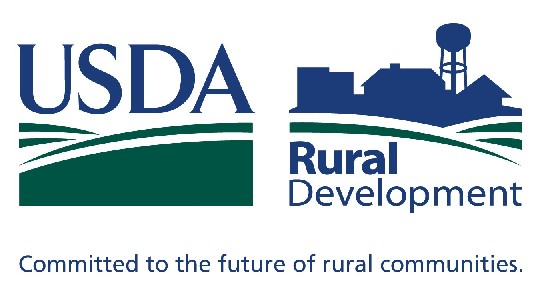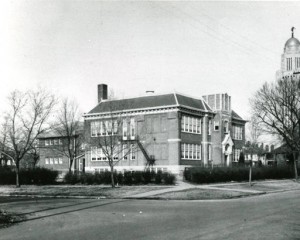Search the Blog
Categories
- Books & Reading
- Broadband Buzz
- Census
- Education & Training
- General
- Grants
- Information Resources
- Library Management
- Nebraska Center for the Book
- Nebraska Memories
- Now hiring @ your library
- Preservation
- Pretty Sweet Tech
- Programming
- Public Library Boards of Trustees
- Public Relations
- Talking Book & Braille Service (TBBS)
- Technology
- Uncategorized
- What's Up Doc / Govdocs
- Youth Services
Archives
Subscribe
Author Archives: Mary Sauers
National my Social Security Week, July 19-25
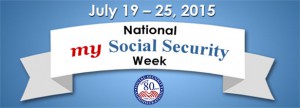 Social Security is excited to announce that July 19-25, 2015 will mark the second National my Social Security Week. During this week, Social Security will host numerous events and activities across the country to raise awareness about the benefits of having a my Social Security account and to encourage the public to sign up for their account at mySocialSecurity.
Social Security is excited to announce that July 19-25, 2015 will mark the second National my Social Security Week. During this week, Social Security will host numerous events and activities across the country to raise awareness about the benefits of having a my Social Security account and to encourage the public to sign up for their account at mySocialSecurity.
Libraries can partner with Social Security by helping to promote and ensure that Americans sign-up for their own mySocialSecurity account. Here are the resources to help you help the people you support. We encourage you to use the information and resources found at my Social Security Information for Groups and Organizations: Learn more about Social Security, Banners and Web Graphics, Newsletter Articles & Blog Posts, Social Media, Fact Sheets and Publications, Posters, Public Service Announcements for Radio, Videos, and a Toolkit.
New State Agency Publications Received at the Library Commission
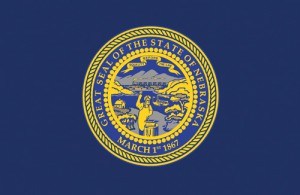 New state agency publications have been received at the Nebraska Library Commission for June 2015. Included are titles from Nebraska Department of Agriculture, Nebraska Department of Health and Human Services, Public Power, and University of Nebraska Press, to name a few.
New state agency publications have been received at the Nebraska Library Commission for June 2015. Included are titles from Nebraska Department of Agriculture, Nebraska Department of Health and Human Services, Public Power, and University of Nebraska Press, to name a few.
Free Immigration Webinar
 On July 2, 2015, the Institute of Museum and Library Services (IMLS) and U.S. Citizenship and Immigration Services (USCIS) will host a free webinar for public librarians on the topic of immigration and U.S. citizenship. Join in to learn more about what resources are available to assist libraries in providing immigrant and adult education services. The webinar, Overview of myE-Verify, will explore a new online service for the general public. Representatives will be on hand to discuss how the service can be used to:
On July 2, 2015, the Institute of Museum and Library Services (IMLS) and U.S. Citizenship and Immigration Services (USCIS) will host a free webinar for public librarians on the topic of immigration and U.S. citizenship. Join in to learn more about what resources are available to assist libraries in providing immigrant and adult education services. The webinar, Overview of myE-Verify, will explore a new online service for the general public. Representatives will be on hand to discuss how the service can be used to:
- Confirm their work eligibility with Self Check
- Create a myE-Verify account
- Protect their Social Security number in E-Verify with Self Lock
- Access myResources, a multimedia resource center to learn about their rights and their employer’s responsibilities.
Webinar Details:
Date: July 2, 2015
Time: 2:00 – 3:00 p.m. EDT
Click here to register
This series was developed as part of a partnership between IMLS and USCIS to ensure that librarians have the necessary tools and knowledge to refer their patrons to accurate and reliable sources of information on immigration-related topics. To find out more about the partnership and the webinar series, visit the Serving New Americans page of the IMLS website or on the USCIS website.
GROW Nebraska Workshop July 2
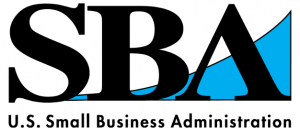 Omaha’s SCORE chapter will host GROW Nebraska for an informative small business workshop Thursday, July 2, from 9:30 a.m. to 11:30 a.m. at the SBA Nebraska District Office, 10675 Bedford Avenue, Suite 100, Omaha. Janell Ehrke, CEO of GROW Nebraska, will explain how the non-profit organization connects entrepreneurs to the world marketplace.
Omaha’s SCORE chapter will host GROW Nebraska for an informative small business workshop Thursday, July 2, from 9:30 a.m. to 11:30 a.m. at the SBA Nebraska District Office, 10675 Bedford Avenue, Suite 100, Omaha. Janell Ehrke, CEO of GROW Nebraska, will explain how the non-profit organization connects entrepreneurs to the world marketplace.
GROW Nebraska provides entrepreneurial coaching and market access opportunities to its members, creating sustainable economic development for more than 350 small business members through promotions, market access and education. They offer more than 20 services, including initial consultations, counseling, product evaluation, and are on the cutting edge of social media marketing training.
GROW Nebraska also allows members to choose to participate in everything the organization offers, or just pay only for low-cost services that best suit them. Instead of forcing one-size-fits-all approaches on each small business client, GROW encourages its members to develop a plan that benefits their business the most.
There is no charge for the workshop, but please register by calling Marilyn Riley at the SCORE office at 402-221-3606 or email score@scoreomaha.org, as space is limited.
“Summer time, and the livin’ is easy…”
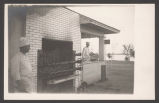 Just like George Gershwin’s song for the 1935 opera, Porgy and Bess, it’s almost summer time, when thoughts turn to picnics, barbeques, and outdoor fun in general.
Just like George Gershwin’s song for the 1935 opera, Porgy and Bess, it’s almost summer time, when thoughts turn to picnics, barbeques, and outdoor fun in general.
Photographs in Nebraska Memories have captured these pursuits over the years. People barbequing, friends and/or families gathering for picnics, fun playing badminton, baseball or foot racing–these have all been (and continue to be) part of Nebraska’s heritage. 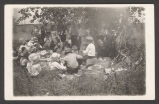
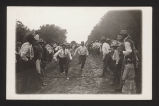 Visit Nebraska Memories to search for or browse through many more historical images like these, digitized from photographs, negatives, postcards, maps, lantern slides, books and other materials.
Visit Nebraska Memories to search for or browse through many more historical images like these, digitized from photographs, negatives, postcards, maps, lantern slides, books and other materials.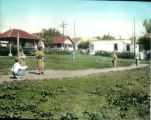
Nebraska Memories is a cooperative project to digitize Nebraska-related historical and cultural heritage materials and make them available to researchers of all ages via the Internet. Nebraska Memories is brought to you by the Nebraska Library Commission. If your institution is interested in participating in Nebraska Memories, see Introduction to Participating in Nebraska Memories for more information, or contact Devra Dragos, Technology & Access Services Director.
Posted in Nebraska Memories
Leave a comment
Friday Reads: The Tea Rose Trilogy by Jennifer Donnelly
From Library Journal:
In The Tea Rose, it is “1888, and Fiona Finnegan and Joe Bristow hoard shillings and pennies so that they can marry and open a shop. But Jack the Ripper stalks the streets of London’s East End, and poverty threatens from the shadows. Setting the story in motion is the murder of Fiona’s father, a dock worker whose union activities angered his tea-company boss. Fiona and her younger brother must flee to New York City to avoid their own murders. Through hard work and luck, Fiona and her beloved Joe prosper on opposite sides of the Atlantic. Misunderstandings and mistakes keep them apart as they build separate lives and incredible fortunes. Children’s book writer Donnelly effortlessly takes her narrative through slums and high society while intertwining a number of subplots without tangling them. Both major and minor characters capture and hold interest and sympathy. ”
The Winter Rose, the second book in the Tea Rose Trilogy, begins “in late Victorian London. Idealistic new medical school graduate India Selwyn Jones goes to work at a clinic in the city’s poorest neighborhood, much to the dismay of her aristocratic mother and ambitious fiancé, political up-and-comer Freddie Lytton. The squalor is a bit much for India, but she manages to keep her emotions under control until she meets underworld crime boss Sid Malone. Sid begins as India’s nemesis, becomes her patient and ends up something much more than that. What India doesn’t know is that Sid is the brother of tea heiress Fiona Bristow, wife of self-made, highly principled businessman Joseph Bristow. What Sid doesn’t know is that India’s fiancé is as ruthless as Sid’s most ruthless henchman, willing to commit theft, betrayal and even murder to launch his career, force India out of hers and bring down Sid in the process.”
From Hachette:
In the third Tea Rose Trilogy book, The Wild Rose, “it is London, 1914. World War I looms on the horizon, women are fighting for the right to vote, and explorers are pushing the limits of endurance in the most forbidding corners of the earth. Into this volatile time, Jennifer Donnelly places her vivid and memorable characters: Willa Alden, a passionate mountain climber who lost her leg while summiting Kilimanjaro with Seamus Finnegan, and who will never forgive him for saving her life; Seamus Finnegan, a polar explorer who tries to forget Willa as he marries a beautiful young school teacher back home in England; Max von Brandt, a handsome German sophisticate who courts high society women, but has a secret agenda in wartime London.”
I listened to the audio versions of these books. They are all narrated by Jill Tanner, who does a wonderful job with all of the character’s voices. Whether you read the book, or listen to the audio version, I’m sure you will find this historical fiction saga as enjoyable as I did.
New State Agency Publications Received at the Library Commission
 New state agency publications have been received at the Nebraska Library Commission for May 2015. Included are titles from Nebraska Department of Education, Nebraska Department of Health and Human Services, Nebraska Department of Labor, and University of Nebraska Press, to name a few.
New state agency publications have been received at the Nebraska Library Commission for May 2015. Included are titles from Nebraska Department of Education, Nebraska Department of Health and Human Services, Nebraska Department of Labor, and University of Nebraska Press, to name a few.
Small Business Administration: Get certified as an 8(a) Firm
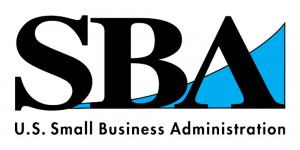 There’s a program that could give your business a big jump in snagging federal government contracts — and the SBA can help you take advantage of it.
There’s a program that could give your business a big jump in snagging federal government contracts — and the SBA can help you take advantage of it.
Why would you want to sell your great products and services to the biggest buyer in the entire world? Here’s eight reasons why getting certified as an 8(a) small business could mean big business.
- The federal government buys everything, from janitorial services to logistics support and everything in between, to the tune of more than $500 billion a year (that’s billion with a B)
- Did you know contracting agencies are required to set aside a certain percentage of all contracts to small businesses, including those with special socio-economic certifications? That gives you the chance to compete with larger contracting firms on a more equal basis.
- If you qualify, you can bid for sole-source contracts up to $4 million for your goods and services, and up to $6.5 million in contracts if you’re a manufacturer.
- You can team up with another business as a joint venture to bid on contracts, allowing you to get more lucrative jobs together as a prime contractor.
- Your business can team up with a more experienced prime contractor and have greater access to financing and successful bids under a Mentor-Protege agreement.
- You can get specialized business training, counseling, marketing assistance and high-level executive development from SBA’s resource partner help that other companies just can’t get.
- Get known to potential purchasers.
- And, by getting certified as an 8(a) firm, you’ll be eligible to buy surplus government property, like desks, computers, tractors, heavy equipment and more, at the same price as government agencies can.
Come learn to see if you qualify, how to apply and leverage your certification.
Sign up now for SBA Certifications: 8(a), Hubzone and ED/WOSB
May 27, 9:30-11:30 a.m.
SBA Nebraska District Office, 10675 Bedford Ave., Suite 100, Omaha
They’ll briefly cover the SBA’s other certification programs, EDWOSB and HUBZone, in addition to the 8(a) program. You will learn:
- Program Details
- Eligibility Requirements
- Benefits
- SBA Assistance to 8(a) firms
- Application process.
Register online at the SBA Event Calendar.
Looking for Library Building Grants? USDA to Give Priority Funding for Regional Economic Development Projects
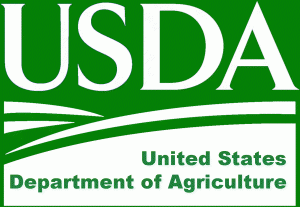 Agriculture Secretary Tom Vilsack announced yesterday the USDA’s plan to implement a Farm Bill provision that will have a major policy impact on the way the Department helps rural communities plan and finance regional economic development strategies. The new Regional Development Priority (RDP) policy will make it easier for rural communities to access resources to invest in long-term community development efforts by giving priority to applications for Rural Development programs that include regional partnerships and strategies.
Agriculture Secretary Tom Vilsack announced yesterday the USDA’s plan to implement a Farm Bill provision that will have a major policy impact on the way the Department helps rural communities plan and finance regional economic development strategies. The new Regional Development Priority (RDP) policy will make it easier for rural communities to access resources to invest in long-term community development efforts by giving priority to applications for Rural Development programs that include regional partnerships and strategies.
“Regional planning maximizes the effectiveness of our investments in rural America,” Vilsack said here today while addressing the 10th Annual Organization for Economic Cooperation and Development (OECD) Conference. “When communities come together to share resources, ideas and expertise, they can develop a cohesive economy strategy and invest in their future. With a strategy in place, USDA-funded projects can spur regional economic transformation, increase job opportunities and improve quality of life for rural communities.”
Under the RDP, communities with multi-jurisdictional economic development plans will be able to request funding priority when they apply for loans and grants in four key USDA programs. These programs help finance a variety of infrastructure, business and community development needs. They are:
- Community Facilities Program (look for library building grants here)
- Business & Industry Loan Guarantee Program
- Water and Environmental Program and
- Rural Business Development Grant Program.
Applicants seeking priority consideration will be judged by (1) how well their funding request supports a region’s existing development plan, and (2) how well the plan addresses regional collaboration and considers other funding sources including philanthropic groups and other federal agencies. Projects that receive funding will be based on locally identified needs and growth strategies that capitalize upon a region’s unique strengths.
Vilsack made this announcement during the 10th Annual Organization for Economic Cooperation and Development Conference in Memphis, Tenn. The conference brings world leaders and policy officials from 34 countries to discuss how modern policies can help rural regions reach their full economic potential, support national growth and be globally competitive. During the conference, Secretary Vilsack reaffirmed his vision for four pillars of rural economic development.
Additional information about the funding priority was published in today’s Federal Register.
Congress authorized USDA to implement this regional approach when it passed the 2014 Farm Bill. That law builds on historic economic gains in rural America over the past six years while achieving meaningful reform and billions of dollars in savings for taxpayers.
Since the bill’s enactment, USDA has made significant progress to implement each provision of this critical legislation, including expanding access to rural credit, developing new markets for rural-made products, and investing in infrastructure, housing and community facilities to help improve the quality of life in rural America. For more information, visit www.usda.gov/farmbill.
Webinar from Health Happens in Libraries: Launching Community Conversations with Local Health Data
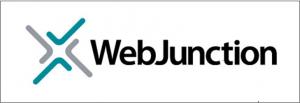 Join this webinar to learn how to build awareness, partnerships and services in support of community health, using County Health Rankings & Roadmaps data and networks.
Join this webinar to learn how to build awareness, partnerships and services in support of community health, using County Health Rankings & Roadmaps data and networks.
Community health data is a powerful tool. It allows public library leaders and local partners to launch conversations and prioritize activities to support community members with reliable health information and services. The County Health Rankings & Roadmaps program provides a comprehensive platform for community based organizations of all kinds to examine and take action on community health data. Attendees at this webinar will learn about ways in which cross-sector collaboration can positively influence social and environmental factors that impact community health. Attendees will also gain familiarity with key features of the County Health Rankings & Roadmaps tool for further exploration of these topics. Attendees will also learn how Buffalo & Erie County Public Library has built awareness, partnerships and services in support of community health, using local data and networks.
Date: 11 June 2015
Time: 2:00 PM – 3:00 PM Eastern Daylight Time, North America
Presenters:
- Kate Konkle, Community Coach, County Health Rankings & Roadmaps and
- Renee Masters, Information Services/Outreach Librarian, Buffalo & Erie County Public Library
Moderated by: Liz Morris, WebJunction
SBA LINC: Help to Access Capital
 There is a demand among entrepreneurs to find financing to get their businesses off the ground or to take the next big step in their expansion plan. Across the country, thousands of small businesses are searching for term loans, equipment financing, lines of credit, invoice financing and real estate loans to help them hire and grow.
There is a demand among entrepreneurs to find financing to get their businesses off the ground or to take the next big step in their expansion plan. Across the country, thousands of small businesses are searching for term loans, equipment financing, lines of credit, invoice financing and real estate loans to help them hire and grow.
This is where technology steps in to meet the demand. Online matchmaking services pairing lenders with prospective borrowers already comprise a multibillion dollar industry. Using the power of the Internet, commercial lenders are finding creditworthy small business borrowers, while entrepreneurs are finding loan officers who are ready to talk with them.
The U.S. Small Business Administration (SBA) is implementing this same matchmaking concept for SBA loan applications. Recently SBA Administrator Maria Contreras-Sweet announced a new SBA initiative called LINC (Leveraging Information and Networks to Access Capital). This SBA matchmaking service will help entrepreneurs connect with a lender.
The SBA spent months surveying their lending partners to discern what information they need from a prospective borrower. They have developed a simple online form with 20 questions that takes just minutes to fill out. Once completed, the form is blasted out to participating SBA lenders in an applicant’s county, as well as financial institutions with a statewide or national reach.
While a positive “hit” won’t ensure entrepreneurs will receive a loan, it will put them on a fast track because they have been pre-screened. If LINC doesn’t produce an immediate match, entrepreneurs will be directed to their local SBA adviser for additional assistance with their loan application.
The LINC matchmaking tool constitutes a huge step toward giving small business entrepreneurs access to essential sources of capital in all 50 states and the U.S. territories.
SBA is committed to becoming as innovative as the small businesses we serve. In the longer term, they also believe LINC could be modified to facilitate government contracting by connecting eligible small businesses with procurement officers, prime contractors and federal buyers. The future is now, and the SBA is proud to embrace technology to help small businesses access the capital they need to stay strong and dream big.
How to Set Up a Citizenship Corner at Your Library
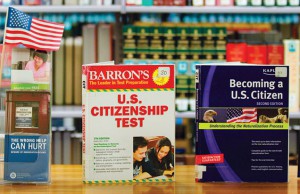 Libraries play an important role in raising awareness about the naturalization process and the rights and responsibilities of U.S. citizenship.
Libraries play an important role in raising awareness about the naturalization process and the rights and responsibilities of U.S. citizenship.
Create a dedicated space in your library where immigrants can find information about becoming a U.S. citizen. USCIS has developed educational materials to help prepare individuals for naturalization. These materials are ideal for setting up a Citizenship Corner in your library. Here immigrants can find the information and resources they need to start the path toward becoming a U.S. citizen.
A typical Citizenship Corner includes citizenship test preparation materials along with information about the naturalization process. Libraries can also add information about community resources, English teaching materials, and other relevant books and videos from their collections. While there are a number of immigration topics that may be of interest to libraries and their customers, USCIS recommends displaying only citizenship and naturalization-related resources in the Citizenship Corner.
How to Set Up a Citizenship Corner at Your Library
- Order one free copy of the USCIS Civics and Citizenship Toolkit. The Toolkit contains immigration and civics publications, handbooks, and multimedia tools. Additional copies are available for purchase through the U.S. Government Printing Office.
- Build your collection by purchasing other USCIS materials. Most of the following publications are also included in the Civics and Citizenship Toolkit:
- The USCIS Naturalization Interview and Test video
- Learn About the United States: Quick Civics Lessons for the Naturalization Test
- Vocabulary Flash Cards for the Naturalization Test
- Civics Flash Cards for the Naturalization Test (English and Spanish)
- Civics and Citizenship Multimedia Presentation
- Download Form N-400, Application for Naturalization and provide copies in the Citizenship Corner. (Remind your customers that all USCIS forms are free.)
- Display and distribute free USCIS informational resources:
- Print 11″ x 17″ citizenship awareness posters in English, Chinese, Spanish, and Vietnamese. Display these posters in the Citizenship Corner, classrooms, and other visible areas.
- Print 6″ x 9″ informational flyers in English, Chinese, Spanish, and Vietnamese. These flyers highlight naturalization eligibility requirements and resources available on the USCIS Citizenship Resource Center.
- Download and distribute the brochure 10 Steps to Naturalization: Understanding the Process of Becoming a U.S. Citizen.
- Download and display the Pathway to U.S. Citizenship poster.
- Enhance your Citizenship Corner with other citizenship-related and English as a Second Language (ESL) resources from your library’s collection:
- Locate the Citizenship Corner near ESL textbooks and resources or post signs directing customers.
- Feature books and magazines that address the content of the 100 civics questions on the naturalization test such as famous Americans, historical events, and important founding documents.
- Arrange your Citizenship Corner to be welcoming and helpful. Here are some additional suggestions:
- Decorate the Citizenship Corner in a patriotic theme.
- Distribute promotional flyers for citizenship or ESL classes offered at your library.
- Distribute flyers from local BIA-recognized organizations that may be able to help immigrant customers with USCIS forms. Visit uscis.gov for more information on finding legal services and BIA-recognized organizations.
- Create and distribute a referral list of local community organizations that provide citizenship services and ESL classes in your community. Start by visiting the Find Help in Your Community page on the USCIS Citizenship Resource Center. Another resource for finding community organizations that offer ESL, civics, and citizenship education classes is America’s Literacy Directory. Search for programs by zip code.
- Add computers to the Citizenship Corner and set the Internet browser home page to www.uscis.gov/citizenship, a one-stop USCIS resource for locating citizenship preparation materials and activities.
- Set up a video monitor at the Citizenship Corner and play The USCIS Naturalization Interview and Test video on a continuous loop.
- Set up a computer workstation that displays Preparing for the Oath: U.S. History and Civics for Citizenship. This interactive website highlights museum objects from the Smithsonian Institution to help people prepare for the civics portion of the naturalization test.
- USCIS often hosts naturalization information sessions and administrative naturalization ceremonies in libraries. View the list of upcoming naturalization information sessions at libraries nationwide. Contact your local USCIS Community Relations Officer if you are interested in USCIS hosting a similar session at your library.
- Create a virtual Citizenship Corner on your library website:
- USCIS offers many free web resources in the Learners section of this site. You may want to add a link on your website.
- Link to USCIS resources by adding a widget to your website. The widgets are small online applications in English and Spanish that can be embedded on social media sites, blogs, or other web pages.
- You can also include information about immigration and citizenship resources available at your library.
Nebraska USDA Rural Development Announces Funds Available for Low Interest Home Repair Loans and Grants
The U.S. Department of Agriculture Rural Development has announced adequate funding remains available to assist very low income households with home repairs. For those who own and occupy homes in need of essential repairs and who are wondering how to get financing, USDA Rural Development can help with grants and low-interest loans for homeowners in rural communities. All communities in Nebraska are eligible for housing programs with the exceptions of Fremont, Grand Island, Hastings, Kearney, Lincoln, North Platte, Omaha and South Sioux City/Dakota City.
Applicants must own and occupy the home and not exceed income guidelines established by county and household size. The family’s income must below 50 percent of the county median income. For many counties in Nebraska, the income limit for a one person household is $21,350; two person, $24,400; three person, $27,450; four person, $30,500 and five person, $32,950. However, some counties may have higher income limits. Please contact your USDA Rural Development office for the details in your county.
Available Low-interest Loans:
Rural Development’s Home Repair Loan program offers low-interest (1 percent) loans, up to $20,000, to very low income rural homeowners. Loans may be used to repair, improve or modernize homes or to remove health and safety hazards. Homeowners must meet household income guidelines, have an acceptable credit history and show repayment ability for the loan based on a household budget.
The USDA repair loan may be made up to $20,000 at a 1% interest rate, with a repayment term up to 20 years. Loans of less than $7,500 may not require a mortgage against the property. The low interest rate and extended terms of the loan make repayment more affordable for households with limited income. For example, a $10,000 loan at 1% interest for 20 years would have a monthly payment of $46, compared to a conventional loan with an interest rate of 5% for 10 years, with a monthly payment of $106.
Available Grants:
Rural Development’s Home Repair Grant program is available to owner-occupants of a rural home, who are 62 years of age or older, are very low income and are unable to repay a loan. Grant funds may only be used to remove health and safety hazards, such as replacing a roof, electrical and plumbing repairs, sanitary disposal systems and accommodations to make the home handicap accessible. Maximum lifetime grant assistance is $7,500.
Eligibility for the program is based on household income and applicants must be unable to repay a loan. If applicants can repay part, but not all of the costs, applicants may be offered a loan and grant combination.
For more information, go to the Nebraska RD website at http://www.rd.usda.gov/ne. You may also contact Single Family Housing Specialist Krista Mettscher at 402-437-5518, krista.mettscher@ne.usda.gov
President Obama’s plan for rural America has brought about historic investment and resulted in stronger rural communities. Under the President’s leadership, these investments in housing, community facilities, businesses and infrastructure have empowered rural America to continue leading the way – strengthening America’s economy, small towns and rural communities. USDA’s investments in rural communities support the rural way of life that stands as the backbone of our American values.
Helping people stay in their home and keep it in good repair helps families and their communities. Households interested in affordable home improvements may contact their local USDA Rural Development office or visit the Agency website at www.rd.usda.gov/ne for additional information.
USDA is an equal opportunity provider and employer. To file a complaint of discrimination, write: USDA, Office of the Assistant Secretary for Civil Rights, Office of Adjudication, 1400 Independence Ave., SW, Washington, DC 20250-9410 or call (866) 632-9992 (Toll-free Customer Service), (800) 877-8339 (Local or Federal relay), (866) 377-8642 (Relay voice users)
New Government Publications Received at the Library Commission
 New state government publications have been received at the Nebraska Library Commission for April 2015. Included are titles from Nebraska Colleges and Universities, Nebraska Game & Parks Commission, the Nebraska Fire Marshal and University of Nebraska Press, to name a few.
New state government publications have been received at the Nebraska Library Commission for April 2015. Included are titles from Nebraska Colleges and Universities, Nebraska Game & Parks Commission, the Nebraska Fire Marshal and University of Nebraska Press, to name a few.
New Government Publications Received at the Library Commission
 New state government publications have been received at the Nebraska Library Commission for March 2015. Included are titles from the Nebraska Department of Agriculture, the Foster Care Review Board, Nebraska Game & Parks Commission, and University of Nebraska Press, to name a few.
New state government publications have been received at the Nebraska Library Commission for March 2015. Included are titles from the Nebraska Department of Agriculture, the Foster Care Review Board, Nebraska Game & Parks Commission, and University of Nebraska Press, to name a few.
http://nlc.nebraska.gov/publications/archives/WhatsUpDoc/WUDMar2015.pdf
Nebraska Memories: A Collection of Collections
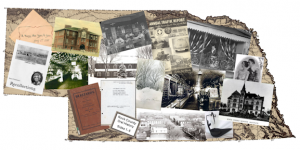 Did you know that Nebraska Memories is a collection of Nebraska cultural heritage collections? When you visit Nebraska Memories, instead of searching for a particular item or person, try clicking on “View Collections.” As a result, you will find Nebraska historical collections from (almost) A-Z. The histories of Nebraska hospitals, cities, towns, counties, public schools, colleges, libraries, musicians, authors, sports and historical events are all represented in the collections found in Nebraska Memories.
Did you know that Nebraska Memories is a collection of Nebraska cultural heritage collections? When you visit Nebraska Memories, instead of searching for a particular item or person, try clicking on “View Collections.” As a result, you will find Nebraska historical collections from (almost) A-Z. The histories of Nebraska hospitals, cities, towns, counties, public schools, colleges, libraries, musicians, authors, sports and historical events are all represented in the collections found in Nebraska Memories.
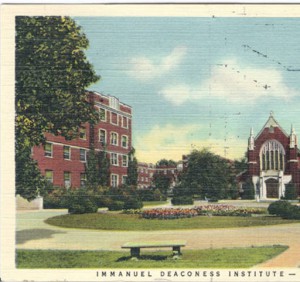 For example, the first collection listed is the Alegent Health Immanuel Medical Center. The rich and well documented history of Immanuel Medical Center in Omaha, Nebraska is shown in the images of the early buildings, people and artifacts. The archive of thousands of photos, papers and items has been maintained for over 120 years, carefully stored and currently housed at the Alegent Health Immanuel Medical Center campus.
For example, the first collection listed is the Alegent Health Immanuel Medical Center. The rich and well documented history of Immanuel Medical Center in Omaha, Nebraska is shown in the images of the early buildings, people and artifacts. The archive of thousands of photos, papers and items has been maintained for over 120 years, carefully stored and currently housed at the Alegent Health Immanuel Medical Center campus.
Other collections in Nebraska Memories include city and county historical societies, such as the Crawford, Fairmont/Filmore County, Hastings, Antelope County, Butler County, and Phelps County, to name a few.
Historical materials related to the Lincoln Public Schools have been collected and saved in some form in various offices, library sites, and schools since the inception of the first school in Lancaster county. Over the years, LPS Library Media Services has made great progress in collecting, preserving, and archiving the history of LPS for the staff and the public.
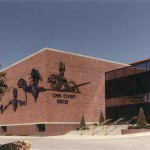 There are other unique collections in Nebraska Memories as well: the Omaha Community Playhouse (pictured right), that includes digitized images of the Playhouse and some of its performances; the Lincoln Police Department, that includes digitized images of police officers from 1885-1907; the Durham Museum in Omaha, with the William Wentworth Collection that consists of 4663 negatives of images that document life in Omaha, Nebraska from 1934 through 1950; and the Bess Streeter Aldrich House and Museum in Elmwood, Nebraska (pictured below), images of which have been selected to give the viewer a deeper understanding of the influences and inspirations that Bess Streeter Aldrich drew upon when writing the 1928 novel “A Lantern in Her Hand.
There are other unique collections in Nebraska Memories as well: the Omaha Community Playhouse (pictured right), that includes digitized images of the Playhouse and some of its performances; the Lincoln Police Department, that includes digitized images of police officers from 1885-1907; the Durham Museum in Omaha, with the William Wentworth Collection that consists of 4663 negatives of images that document life in Omaha, Nebraska from 1934 through 1950; and the Bess Streeter Aldrich House and Museum in Elmwood, Nebraska (pictured below), images of which have been selected to give the viewer a deeper understanding of the influences and inspirations that Bess Streeter Aldrich drew upon when writing the 1928 novel “A Lantern in Her Hand.
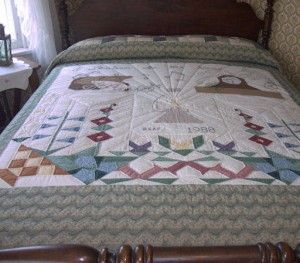 Visit Nebraska Memories to search for or browse through many more historical images digitized from photographs, negatives, postcards, maps, lantern slides, books and other materials.
Visit Nebraska Memories to search for or browse through many more historical images digitized from photographs, negatives, postcards, maps, lantern slides, books and other materials.
Nebraska Memories is a cooperative project to digitize Nebraska-related historical and cultural heritage materials and make them available to researchers of all ages via the Internet. Nebraska Memories is brought to you by the Nebraska Library Commission. If your institution is interested in participating in Nebraska Memories, see Introduction to Participating in Nebraska Memories for more information, or contact Beth Goble, Historical Projects Librarian, or Devra Dragos, Technology & Access Services Director.
Friday Reads : The Meaning of Names
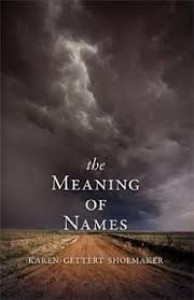 Last year the nation recognized the centennial of the First World War. The sacrifices of men and women on the home front, as well as the violence and hatred that swept across America during World War I (WWI) are addressed in The Meaning of Names.
Last year the nation recognized the centennial of the First World War. The sacrifices of men and women on the home front, as well as the violence and hatred that swept across America during World War I (WWI) are addressed in The Meaning of Names.
From Amazon:
“Stuart, Nebraska is a long way from the battlefields of Western Europe, but it is not immune to the horrors of the first Great War for Peace. Like all communities, it has lost sons and daughters to the fighting, with many more giving themselves over to the hatred only war can engender.
Set in 1918 in the farm country at the heart of America, The Meaning of Names is the story of an ordinary woman trying to raise a family during extraordinary times. Estranged from her parents because she married against their will, confronted with violence and prejudice against her people, and caught up in the midst of the worst plague the world has ever seen, Gerda Vogel, an American of German descent, must find the strength to keep her family safe from the effects of a war that threatens to consume the whole world.”
The Meaning Names is the 2014/15 Omaha Reads selection. While I am only half-way through it, I completely agree that this is a must-read about what life was like in the Midwest during World War I and the Spanish Flu Pandemic of 1918-1919.
Nebraska author Karen Gettert Shoemaker is a faculty mentor with the University of Nebraska’s MFA in Writing Program. She lives in Lincoln, Nebraska, where she and her husband own and operate Shoemaker’s Truck Stop and Travel Center.
InnovateHER: 2015 Innovating for Women Business Challenge
 InnovateHER is a cross-cutting women’s business challenge to unearth innovative products and services that help impact and empower the lives of women and families.
InnovateHER is a cross-cutting women’s business challenge to unearth innovative products and services that help impact and empower the lives of women and families.
We know that our workforce looks very different from 50 years ago. Women now make up nearly half of the labor force and play a critical role in our nation’s economic prosperity. Most children live in households where all parents work. And as our population ages, families are increasingly caring for aging parents while balancing the needs of work and home. As demands on women and families grow, the need for products and services that address unique challenges increases. This Challenge will provide that platform.
Challenge Criteria
InnovateHER provides an opportunity for entrepreneurs to showcase products or services that have a measurable impact on the lives of women and families (30%), have the potential for commercialization (40%), and fill a need in the marketplace (30%).
Participants must be at least 18 years of age, U.S. citizens or permanent residents, and meet other requirements as defined in the Competition Rules.
How to Participate
Throughout the month of March, universities, accelerators, resource partners and other organizations will host local competitions. A month after going live, each host will select and submit one local winner to the SBA, who will then identify no more than 10 finalists. Finalists will make a live pitch to a panel of expert judges during National Small Business Week, May 4 – 8, 2015, in Washington, D.C. where they will compete for top three awards and prize money totaling $30,000.
Finalists will be responsible for covering their own travel costs to DC for the national competition.
2015 InnovateHER Local Competitions – Updated
View a map of InnovateHER host organizations
Download the list of locations and contacts as a spreadhseet
SBA will continue to update this list as additional host organizations are confirmed.
More Questions?
- Read our Frequently Asked Questions
- Contact us at womenbusiness@sba.gov (link sends e-mail)
Grand Island to Host Conference Dedicated to Growing Women Entrepreneurship in Nebraska
 To help celebrate Women’s History Month in March, the U.S. Small Business Administration and the Rural Enterprise Assistance Project’s Women’s Business Center will host a day of speakers designed to inspire and offer down-to-earth advice for women to start or grow a small business.
To help celebrate Women’s History Month in March, the U.S. Small Business Administration and the Rural Enterprise Assistance Project’s Women’s Business Center will host a day of speakers designed to inspire and offer down-to-earth advice for women to start or grow a small business.
The Women Entrepreneur Conference is scheduled for Wednesday, March 18 from 8 a.m. to 3:30 p.m. at the YWCA of Grand Island, 211 East Fonner Park Road.
Patricia Brown-Dixon, Region VII Administrator, U.S. Small Business Administration and Rebecca Greenwald, Region VII Advocate for the SBA, will offer remarks. Additionally, among those on the agenda are:
- Jennifer Rosenblatt of Argyle Octopus, a marketing firm which took home the award as the SBA’s Small Business of the Year for the 1st Congressional District in 2014;
- J’Nan Ensz, Accounting & Business Consulting Group, LLC;
- Speakers from the University of Nebraska-Lincoln Entrepreneurship Legal Clinic;
- And, Kitty Vacha, owner of Tasteful Indulgence, Cake Art of Seward; Megan Gewecke of Stepping Stones Psychological Services, LLC; and Sally Jurgensmier, owner of sculptures by SALLY, will serve on a panel of local entrepreneurs who will share their challenges and successes as women small business owners.
The event also will offer a half-hour fun and fast networking event hosted by Lisa Tschauner and Megan Arrington of Open For Business Magazine, to connect entrepreneurs with resource providers and other small businesses.
According to figures provided by the SBA Office of Advocacy, 6.6 percent of women in Nebraska are self-employed, and women represent 32.5 percent of all small business owners. Small businesses significantly impact Nebraska’s economy. They represent nearly 97 percent of all employers and employ 48 percent of the private-sector labor force. The latest data shows 167,678 small businesses in the state.
The $35 registration fee also covers lunch and may be paid at the door. Register online at http://events.sba.gov/eventmanagement/EventRegistration.aspx?id=9bc4ad23-d99c-e411-8f7e-02bfa56e2a24.
For more information, please call Monica Braun, REAP Women’s Business Center Director at (402) 643-2673 or Elizabeth Yearwood, Economic Development Specialist at the SBA, at (402) 221-7200.
For more information regarding SBA, please visit our website at: www.sba.gov/ne.
New Government Publications Received at the Library Commission
 New state government publications have been received at the Nebraska Library Commission for February 2015. Included are titles from Administrative Services, Colleges and Universities, Education, and Public Power, to name a few.
New state government publications have been received at the Nebraska Library Commission for February 2015. Included are titles from Administrative Services, Colleges and Universities, Education, and Public Power, to name a few.
http://nlc.nebraska.gov/publications/archives/WhatsUpDoc/WUDFeb2015.pdf




